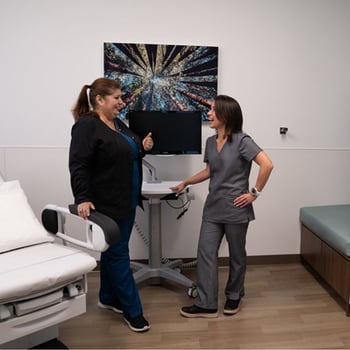Working to build a more diverse, equitable, and inclusive healthcare workforce is, of course, the right thing to do. But it can also contribute to better health outcomes for patients. And, for healthcare professionals, it can result in increased engagement in the workplace and greater job satisfaction.Here at Vera, we’ve established diversity, equity, and inclusion (DEI) committees throughout the organization that use a curriculum based on the principles of diversity, inclusion, justice, and equity.
 At our care center, our clinical team felt it was important to guide conversations on racism and equity now in light of our nation's reckoning with racial injustice. We knew that getting on the same page, together, was the first step.
At our care center, our clinical team felt it was important to guide conversations on racism and equity now in light of our nation's reckoning with racial injustice. We knew that getting on the same page, together, was the first step.
It is important for us to understand what racism is, and the mechanisms within our society that perpetuate it. Because race has been a principal force in building, sustaining, and shifting social and political structures. It plays a significant role — explicitly or implicitly — in many of the decisions that we make in our personal, professional, and social lives. Where we live, who our children’s friends are, who our friends are, etc. Our collective understanding of race thus far has been incomplete and distorted. By having a transformative dialogue on race, we can shine light on the structural dynamics of social and economic disparities and their intersectionality. When we start with race, we start from the bottom of social disparity — hence we are building equity for all when we work on racial equity.
Our goal with starting this discussion at the team level was to lay the groundwork for future conversations by exploring concepts related to individual, cultural, and institutional racism and how they show up in various forms, such as microaggressions. And, we wanted to get comfortable talking about racism.
 We led this effort internally, organizing a small DEI committee to prepare 30-minute discussions that occurred once a month during our weekly team meetings. Before each discussion, we met to talk about the structure and focus of the meeting. After each discussion, we met to debrief and talk about next steps. Each discussion started with personal reflection and sharing of the group’s experiences. We then led a brief presentation on the topic, including questions to help people think more about how these topics show up for them in their lives and at work, and space for the discussion.
We led this effort internally, organizing a small DEI committee to prepare 30-minute discussions that occurred once a month during our weekly team meetings. Before each discussion, we met to talk about the structure and focus of the meeting. After each discussion, we met to debrief and talk about next steps. Each discussion started with personal reflection and sharing of the group’s experiences. We then led a brief presentation on the topic, including questions to help people think more about how these topics show up for them in their lives and at work, and space for the discussion.
It has brought us closer together as a team because of the personal experiences we have shared regarding race and equity. We feel this discussion series has helped us become more comfortable to have difficult conversations, not just about race. It has also led us to provide better patient care since we are more aware of how racism can affect their healthcare experience.
If you’re interested in facilitating a deeper understanding through conversations with your patients, we have many strategies that we’re confident can help. Learn about the different ways you can build trust with your patients and ensure they receive the care they need by checking out our white paper to Empathetic Listening: The Key To Unlocking Better Care And Better Health Outcomes.
Sign up
Join our email list to receive the latest open positions, Vera Careers news, and more.





